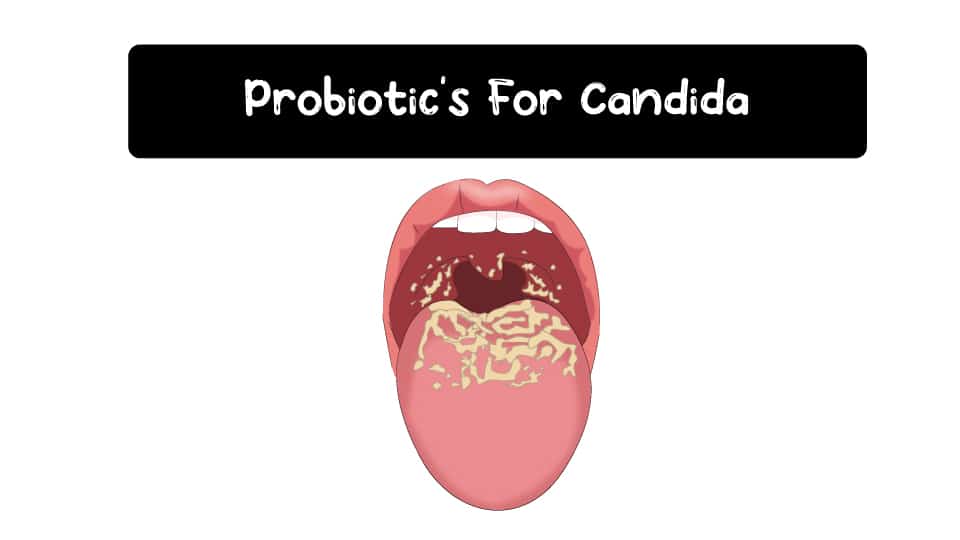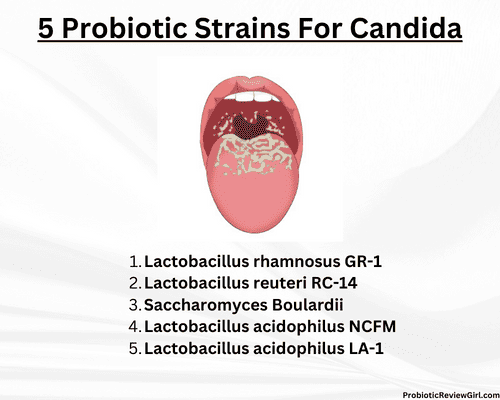Can Probiotics Help With Candida Infection?

According to research, there is therapeutic potential for probiotics to reduce Candida infections. Probiotics help fight Candida by reintroducing beneficial bacteria to the gut, regulate stomach acidity, boost the immune system, secrete capric acid and displace Candida populations.
Candida infections are fungal infections caused by the overgrowth of Candida, a type of yeast naturally found in the body, leading to various localized or systemic symptoms. Probiotics like Lactobacillus on the other hand are live microorganisms that, when consumed in adequate amounts, confer health benefits by improving the balance of beneficial bacteria in the gut. Below, are 5 probiotics strains evaluated for reducing candida.
What Probiotic Strains For Candida?
The 5 best probiotic strains with the most scientific evidence for candida are 1. Lactobacillus rhamnosus GR-1®, 2. Lactobacillus reuteri RC-14®, 3. Saccharomyces Boulardii, 4. Lactobacillus acidophilus NCFM and 5. Lactobacillus acidophilus LA-1 as shown below in the graphic.

How Long Does It Take For Probiotics To Treat Candida?
According to research it takes between one week to four weeks or 7 to 28 days for probiotics to treat symptoms of candida. A 2021 study authored by Z Vahedpoor, found probiotics supplementation for 4 weeks showed a significant reduction in vaginal candidiasis symptoms. Oral and vaginal supplementation with probiotics for 1 month played a significant role in eliminating vaginal candidiasis symptoms.
Do Probiotics Cause Candida Die Off?
Yes, Probiotics can cause a Jarisch–Herxheimer die off reaction. A 2013 study authored by JJ Rucklidge, is relevant to candida die-off as it investigates the impact of yeast infections, specifically Candida. It was hypothesized that the infection might impair the absorption of micronutrients, potentially influencing the occurrence of candida die-off symptoms.
Candida die-off refers to the temporary exacerbation of symptoms experienced by individuals during the elimination of Candida overgrowth as a result of the release of toxins and byproducts from the dying Candida cells.
Can Probiotics Make Candida Worse?
Probiotics cannot exacerbate candida infections by stimulating the proliferation of the yeast fungus or facilitating its spread. Extensive research has shown no documented instances of probiotic bacteria worsening candida infections. Probiotics have been investigated as a potential adjunctive therapy for candida management due to their ability to restore microbial balance and support immune function. While individual responses may vary, the overall evidence suggests that probiotics are safe and unlikely to worsen candida infections.
Can Prebiotics Make Candida Worse?
Prebiotics like fructo-oligosaccharides (FOS) or inulin can worsen Candida infections by providing nourishment to the Candida yeast and promoting its growth. Unlike probiotics, prebiotics are non-digestible fibers that serve as a food source for various microorganisms, including both beneficial and harmful bacteria. Prebiotics cannot differentiate between the different types of bacteria and fungi present in the gut, including Candida.
What Causes Candida?
Candida overgrowth can be caused by factors like high sugar consumption, stress, medications, and imbalances in the gut microbiome. Systemic Candidiasis can manifest as localized yeast infections, and it may also be associated with mental health disorders, chronic fatigue syndrome, skin issues, joint pain, and other chronic health complaints. Symptoms of Candida overgrowth in the gut can include digestive issues, white tongue coating, food intolerances, and leaky gut.
Does Leaky Gut Cause Candida?
When Candida overgrowth occurs in the gut, it can contribute to the development of Leaky Gut syndrome. This syndrome involves increased permeability of the intestinal lining, allowing Candida toxins to enter the bloodstream and potentially affect other areas of the body.
Scientific evidence supporting Leaky Gut syndrome is limited, but according to CA Kumamoto, there is a connection between Candida overgrowth and certain digestive disorders such as Crohn's disease, ulcerative colitis, and celiac disease, which are associated with food sensitivities and allergies.
Dr. Sara Mesilhy has a Master’s degree in Gastroenterology and holds a membership with the Royal College of Physicians of the United Kingdom. She completed her Bachelor of Medicine, Bachelor of Surgery (MBBS) at Cairo University and is currently part of the ProbioticReviewGirl medical team.